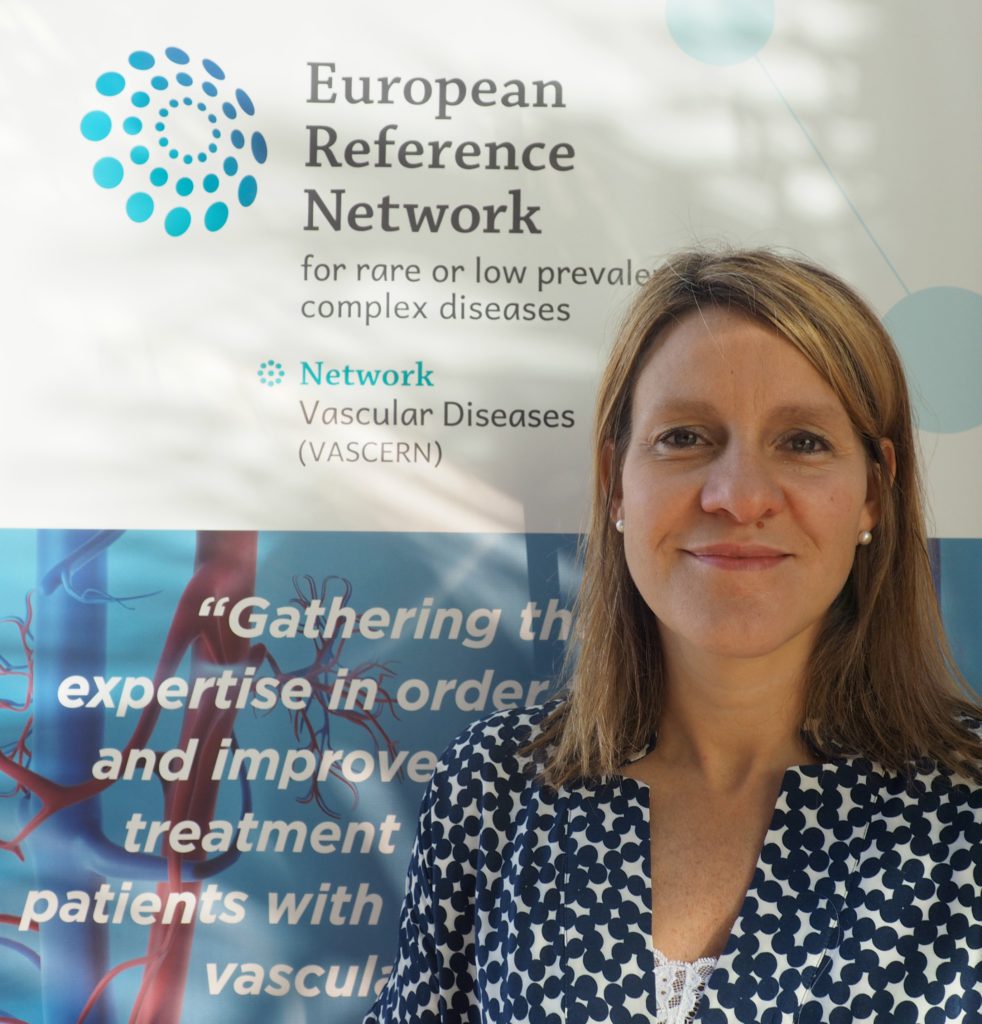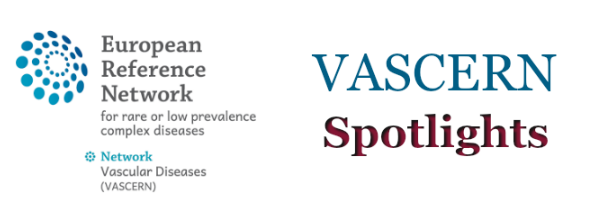
This month we had the chance to interview Dr. Sarah Thomis, a vascular surgeon from Belgium and member of the Pediatric and Primary Lymphedema Working Group (PPL WG). Dr. Thomis tells us how she became involved with VASCERN, what she believes are the greatest accomplishments of VASCERN to date and what she enjoys most about being a part of our network.
1. What is your medical specialty and what interested you in this field?
I am a vascular surgeon and I specialize in lymphology and phlebology. Phlebology was my first interest as it was a specialty where there were very few specialists at the time, so there was still much to discover However, I also saw many lymphedema patients in the clinic and it was after I started working with Nele Devoogdt, a physical therapist and PPL WG member who was dong her PhD on lymphedema, that I became more interested in lymphology. It is a very fulfilling specialty as it is challenging. It is not like in some surgical fields where you perform a surgery and you cure the patient, with lymphedema you need to set up a plan and adjust it according to the results and then research new solutions. That’s why it is so fulfilling when you can really help the patient to obtain favorable results. I see both primary and secondary lymphedema patients as patients with edema come to our clinic not knowing what the cause is, so we see a variety of patients ranging from infants to adults.
It is not like in some surgical fields where you perform a surgery and you cure the patient, with lymphedema you need to set up a plan and adjust it according to the results and then research new solutions. That’s why it is so fulfilling when you can really help the patient to obtain favorable results.
2. How did you become involved in VASCERN?
It was Professor Robert Damstra (Chair of the PPL WG) who informed us of the call for the European Reference Networks (ERNs). He was already a good contact person for us in the field and we had visited his clinic in the past and kept in touch. We were eager to participate in any European or international projects where we could learn more about lymphedema from collaborating with other experts, so when he told us about the call for the ERNs and VASCERN we applied and were accepted.
3. What is your greatest hope for VASCERN?
My greatest hope is to be able to do much more research in the field of rare vascular diseases and I think that the ERNs are a good first step in getting all the experts together. In terms of lymphedema, it is often difficult to treat as patients all have a different clinical phenotype and so we need to initiate valuable research that will lead to better treatment for patients.
The second goal is to make sure that patients know where to go to get a quick diagnosis and expert care in each country. So, I hope that thanks to VASCERN patients will know where to find the care they need and therefore reduce the diagnostic delay that primary lymphedema patients often experience. It is a pity when I see patients who have had so many exams and seen so many different doctors that could not help them before arriving at a diagnosis. With the ERNs I hope that this will no longer happen.
4. What challenges do you face as a healthcare professional in the rare disease field?
I think that in the rare disease field the challenges are that there are a lot of uncertainties when it comes to treatment and diagnosis so we still have a lot to discover and much research to be done in order to get some good results and learn how to better treat patients. It is also challenging to find the time to work on rare disease research as we don’t always have support from our hospitals to do this. Luckily at University Hospitals Leuven – UZ Leuven, as we are a member of 19 ERNs, we have a centralized team that can help us with registries and other data entry tasks related to ERN work.
What I am most proud of is that I am able to help patients, as that was my main goal when I decided to pursue a career in medicine, so I am very happy that I am able to do this.
5. What have you accomplished in your medical career that you are most proud of?
This is a difficult question to answer! I was of course very happy when I received my vascular surgery diploma. Then the second accomplishment that I achieved, together with Nele, was establishing our lymphedema clinic in 2014 at UZ Leuven and then having it recognized by the Belgian government two years ago as an expert center for lymphedema. Our expert center joining VASCERN was also a very nice accomplishment. What I am most proud of is that I am able to help patients, as that was my main goal when I decided to pursue a career in medicine, so I am very happy that I am able to do this.
6. Are you currently involved in any research projects or clinical trials? If so can you please describe them briefly?
We are currently working on several research projects involving secondary lymphedema, mainly involving patients that have developed lymphedema after breast cancer treatment. We are also setting up a research project on the effects of a ketogenic diet on lymphedema, where by modifying a patient’s diet we try to improve lymphatic transport, which is something quite new. We will start with secondary lymphedema patients and then enlarge it to primary lymphedema patients. We will also be starting a study on physical therapy and lymphedema, as we know that physical activity has a positive effect on lymphedema but there have not yet been many studies showing that the results of treatment are better maintained if patients engage in a regular physical training program in the maintenance phase. This will be very individualized for each patient in the program as the physical capabilities and limitations of each patient is different, so they will follow a personalized fitness plan and we will monitor the effect this has on their lymphedema.
The PPL WG is a very motivated group of people that share the same intentions, motivations and research goals, so it is really nice to work with them.
7. What VASCERN activities do you participate in and which are your favorite?
I participate in the monthly PPL WG videoconference meetings as well as all the yearly annual seminars (VASCERN Days 2017, 2018 and 2019) and the PPL WG face to face meetings (like the one in London last year). I prefer the face to face meetings as it gives us the chance to have very interesting discussions with our colleagues and we can learn a lot from each other. We also have a very nice group of people in our working group so we can easily become friends with them as well. While our PPL WG face to face meeting this year will be held online (happening June 4-5th, 2020), we were very fortunate to see each other several times in person last year. The PPL WG is a very motivated group of people that share the same intentions, motivations and research goals, so it is really nice to work with them.
8. What are the main achievements of VASCERN to date? What challenges does VASCERN still face?
Firstly, that we have been able to bring all of these experts and patient advocates together. It is a great way of getting to know each person in a more profound way and we can help each other enormously from sharing our experiences. For patients, I think that the VASCERN website is very valuable for finding resources and the VASCERN mobile app is also a great achievement as it allows patients to find the closest expert centers so that they can have a quicker referral and diagnosis and then receive the proper treatment they need for their rare disease.
One of the main challenges we still face in my opinion is setting up the VASCERN registry as it is a large and difficult task and will require support and time to enter all this patient data into a common registry. At UZ Leuven we are lucky as we have a rare disease board as well as a good coordinator and dedicated personnel that will be helping with this project, but for others it will not be as easy to do without support and funding. The fact that there are so many different database systems being used by each ERN adds an additional complication, so we need to find ways to efficiently extract and transfer data easily from our hospital databases to the new VASCERN registry.




